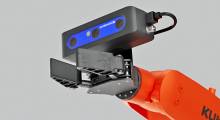LUCID Vision Labs, Inc., a Canada-based designer and manufacturer of industrial cameras, recently announced the launch of the new Phoenix Dual Extended-Head camera, expanding its modular Phoenix camera family.
The company also announced that it received a 2024 VSD Innovators Award for innovation in machine vision.
LUCID camera enhancements
The Phoenix Dual Extended-Head camera transmits synchronized images from its dual 5.0 MP sensors, catering to a diverse range of applications that require a wider Field of View (FoV). Equipped with two Sony IMX264 global shutter image sensors, each with a resolution of 2448 x 2048 pixels, this camera is tailored to provide an extended FoV for stereo vision systems, Autonomous Mobile Robots (AMRs), Unmanned Arial Vehicles (UAV) and Intelligent Transportation Systems (ITS). Its lightweight and compact 28 x 28 mm design allows for easy integration into various space-constrained setups.
“Whether deployed for stereo vision configurations, drones with diverse viewing angles, or Intelligent Transportation Systems (ITS) applications requiring both IR-filtered and non-filtered sensors, the Phoenix camera ensures consistent and reliable performance with its dual extended-head, single-body design,” said Rod Barman, founder and president of LUCID Vision Labs. “The camera delivers a cost-effective solution for multiple sensor setups, offering synchronized images and more flexibility to position the sensors as needed.”
All LUCID cameras adhere to the GigE Vision 2.0 and GenICam3 standards, and are supported by LUCID’s own Arena Software Development Kit (SDK). The Arena SDK provides customers with access to the latest industry standards and software technology and is compatible with the Windows, Linux 64-bit, and Linux ARM operating systems, and supports the C, C++, C#, and Python programming languages.
Innovators Award recognition for two LUCID cameras
At the awards, LUCID Vision Labs stood out with two of its machine vision cameras receiving recognition. The Triton HDR camera, featuring AltaView on-camera tone mapping, received a “Gold Award,” while the Triton2 – 2.5GigE camera was recognized with a “Silver Award.”

The Triton HDR camera delivers real-time tone-mapped 120 dB HDR images directly from the camera, creating a higher standard for image quality with enhanced details in shadows and highlights. The Triton2 – 2.5GigE camera offers rapid data transfer rates of 300 MB/s, which strikes a balance between performance, size and cost for users seeking faster acquisition speeds.
“It's been another remarkable year of innovation for LUCID, and we're thrilled to see two of our products recognized by VSD's Innovators Awards,” Barman said. “These awards underscore our dedication to pushing the boundaries of machine vision technology. We remain committed to delivering cutting-edge solutions that empower our customers to achieve their vision system goals.”
Article topics
Email Sign Up
















